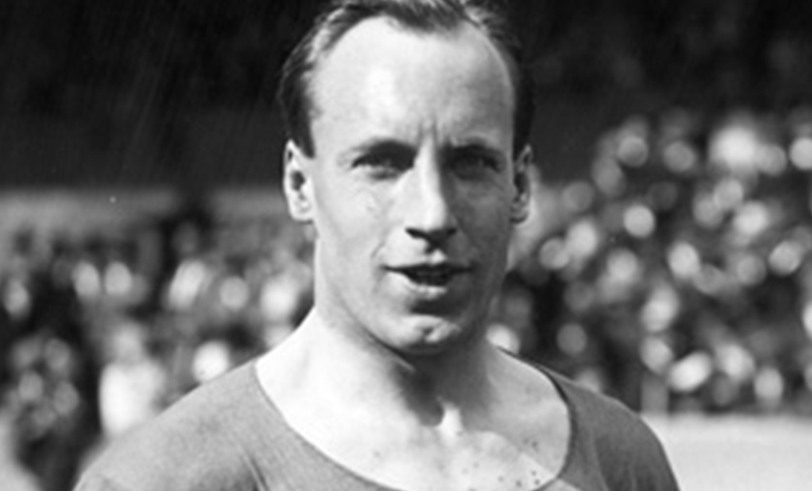Thanks to the Oscar-winning film Chariots of Fire, many remember Liddell as a devout Christian sprinter. But fewer are aware of his post-athlete life as a courageous missionary.
DISCOVERING HIS SPEED
Eric Liddell was destined for a life of bewildering extremes. At one moment he was crossing the finish line to achieve an athlete’s highest honor, the Olympic gold medal; at another time, he found himself suffering and afflicted in a war camp. Nonetheless, Liddell remained steadfast in Jesus Christ, his short but exemplary life demonstrating that the Christian identity transcends circumstance or achievement.
Born on January 16, 1902, Liddell was raised in China by Scottish missionary parents who were a part of the London Mission Society. When he grew older, Liddell and his brother were sent to a London boarding school for the sons of missionaries. The all-male environment thrived on competition, and Liddell proved himself as a worthy competitor in almost every element of sport.
Liddell’s natural athleticism surfaced at an early age, as he outperformed his classmates on the playing field and between the track lanes. At the age of 15, Liddell was named best athlete of the year and became the youngest in school history to captain both the cricket and rugby teams.
When he moved to Scotland to attend Edinburgh University, Liddell’s looming reputation preceded him, with local newspapers dubbing him as the “Flying Scotsman.” He eventually received a spot on both the Scottish International Rugby team and Scotland’s Olympic Team. The young man remained modest and casual throughout the fanfare, adding to his immense likability. Liddell’s headmaster once praised his self-effacing character as “entirely without vanity.”
Chariots of Fire took dramatic liberties with Liddell’s story, but one scene in particular maintained its historical accuracy and captured the extraordinary scope of Liddell’s quickness. In the Stoke-on-Trent quarter-mile race in 1923, Liddell tripped, falling behind the other runners by 20 to 30 meters. A setback during such a short distance event should have been unrecoverable. But Liddell gave chase, overtaking each runner one by one, and won the race in the last three meters. Observers of the herculean feat proclaimed it as “the greatest ever track performance that they had ever seen.”
Although reserved and introverted, Liddell spoke publicly about his Christian faith, often attracting large audiences who weren’t necessarily religious but were interested in what the soft-spoken celebrity had to say. God had bestowed upon Liddell the gift of incredible speed, but Liddell was humbled so that such this talent could be used for eternal purposes.
LIDDELL’S DECISION
All of Scotland knew of the quiet man’s faith as he entered the 1924 Paris Olympic Games, but soon the entire world would hear of it too. Liddell had never lost the 100-meter race. In 1923 he set a personal best time of 9.7 seconds, a British record that lasted for 35 years. This is blazingly fast considering the era’s sports technology: heavy leather running spikes, loose cinders for track material, and small trenches for starting blocks. Despite his dominance at the distance, Liddell refused to race because the qualifying heat was scheduled on a Sunday. He had never run competitively on the Lord’s Day, and he never would.
The news of Liddell’s decision angered many Scots. Members of the British Olympic Association attempted to reason with him. They pointed out that since the race was in the afternoon, he would still have time to attend church in the morning. One member stated the Continental Sabbath lasted only until noon, so the race wouldn’t conflict with his spiritual convictions. Liddell’s response was resolute: “Mine lasts all day.” He wouldn’t be persuaded by these technicalities. To him, the Christian Sabbath had always been a holy and separate day dedicated to God. It wasn’t a day for games—even the Olympics.
By choosing not to run, Liddell sacrificed two potential gold medals. In addition to the 100 meters, the 4×400-meter relay (in which Britain placed third) was also on Sunday.
Instead, he ran the 400 meters. Liddell drew the outermost lane, recognized as the most difficult lane to win in because one cannot see any opponents around the first bend. Nevertheless, he finished ahead of the nearest racer by a full meter, obliterating the former world record in typical Liddell style—head flung back, mouth open, and arms reeling.
The Press Association described the race like this: “There was a gasp of astonishment when Liddell was seen to be a clear three yards ahead of the field at the half distance…With head thrown back and chin thrust out in his usual style he flashed past the tape to win what was probably so far the greatest victory of the meeting. Certainly there has not been a more popular win. The crowd went into a frenzy of enthusiasm.”1
THE MISSION FIELD
Chariots of Fire ends on this high note, with fans carrying their Scottish hero on their shoulders (a scene inspired from when Liddell’s fellow classmates paraded him around the streets upon his return to Edinburgh). Unfortunately, this happy denouement leaves the latter part of his life to disappear into history—a truly sad reality since the second stage is even more remarkable than the first.
Liddell concluded his British racing career in 1925 at the Scottish Amateur Championships, sweeping the competition with wins in the 100-meter, 220-meter and the quarter-mile events.
Despite being in his prime, Liddell walked away from it all and followed his parents’ footsteps to become a missionary in China. Hundreds gathered to see him off at Waverley Station. When asked to give a farewell speech, Liddell deflected the attention by instead leading the crowd in the eighteenth-century hymn “Jesus Shall Reign Where’er The Sun.”
Liddell returned to his birthplace of Tientsin, where he taught science to Chinese college students. His friendly and energetic personality quickly made him a popular figure with the students and the mission’s team.
Liddell continued running overseas. In 1929 he had the opportunity to race German track star Otto Peltzer, the European 1500-meter record holder, in an 800-meter sprint. Liddell led after the first 400 meters but ended up losing narrowly. Since Liddell favored shorter distances, Petlzer was amazed by how well his ability translated to longer courses: “If you train for 800 meters you will be the greatest man in the world at that distance.”
SAYING GOODBYE
Liddell married Canadian missionary Florence Mackenzie in 1934. They had three daughters, the last of which Liddell would never meet. By 1941 invading Japanese forces were threatening invasion, so the British government ordered British nationals to leave China. While his family left for Canada, Liddell remained behind. He sensed God was calling him to stay. One can only imagine the intense pain that accompanied such a heart-wrenching choice, especially when the future was so uncertain.
What makes Liddell’s decision so noble is that it was entirely voluntary. No one would have blamed Liddell for taking the easy route by going with his loved ones. This extraordinary sacrifice distinguishes Liddell as a man of utmost obedience.
After his family’s departure, Liddell travelled through war-torn territory to a rural mission station to care for needy Chinese locals until 1943, when the Japanese overtook the safehouse.
WAR CAMP
Liddell spent the remainder of his life, roughly two years, in an internment camp. He served as a sort of youth director, putting on activities and games for the children and teenagers. The Lord had provided Liddell with a purpose, and according to camp survivor Langdon Gilkey, he embraced it wholeheartedly.
“Often in an evening I would see him bent over a chessboard or a model boat, or directing some sort of square dance—absorbed, weary and interested, pouring all of himself into this effort to capture the imagination of these penned-up youths. He was overflowing with good humor and love for life, and with enthusiasm and charm. It is rare indeed when a person has the good fortune to meet a saint, but he came as close to it as anyone I have ever known.”2
Liddell took it upon himself to hold services on Sunday. Liddell was no preacher, but he recognized the importance of regular corporate worship.
At first Liddell also kept his practice of the Sabbath, but the job of entertaining the children never stopped—even on Sundays. Not wanting them to attract any unwanted attention from the guards when arguments and brawls inevitably arose, Liddell set aside his longstanding rule and chose to oversee the children’s activities. Although small, this gesture reveals Liddell’s discernment between well-intentioned rituals and legalism.
Over time, the camp’s morale deteriorated, with vicious fights breaking out over meals, sleeping spaces, and the lack of basic utilities. Eyewitness testimonies agree that the Olympic gold medalist genuinely humbled himself by becoming a servant-leader to everyone, volunteering for the most menial tasks, assisting the elderly, and teaching science and Bible classes to the children. Reflecting on Liddell’s caring nature combined with his worn-out sneakers, an internee called him “Jesus in running shoes.”
At the beginning of 1945, Liddell began experiencing dizzy spells and minor strokes. Ultimately a brain tumor abruptly ended his life on February 21, 1945, just five months before the camp’s liberation. Joyce Stranks, one of Liddell’s camp friends who was with him during his final conscious moments, said he slipped into a fatal coma just after stumbling over the word “surrender”—a fitting one-word summation of Liddell’s life in service to God.
Everyone in camp felt that a bright light had been snuffed out. The church couldn’t hold all of the people at his memorial service the following day.
A LASTING LEGACY
Liddell’s passing was confirmed when camp survivors later spoke about their impactful experiences with “Uncle Eric”—the affectionate nickname he had been given. Some weeks transpired before Britain connected the title with the legendary Scottish runner. Certain reports later arose stating that Liddell had waived a prisoner of war exchange, offering his place to a pregnant woman instead.
He was buried behind the Japanese officers’ quarters, left to be forgotten until 1989 when it was rediscovered. Only a small wooden cross marked his grave. The grounds were later converted into a school. Today, a single headstone memorializes the site. Engraved on it is following inscription: “They shall mount upon wings as eagles; they shall run and not be weary” (Isaiah 40:31).
Liddell’s legacy continues to shine, not due to his success as an Olympian, but because of his complete submission to the Lord’s will. The meek man of faith possessed something special, and it wasn’t just superhuman speed. Liddell lived with a singular vision of God’s glory in every harrowing circumstance. This eternal perspective allowed Liddell to rejoice in running through the narrow gate (Matthew 7:13), even when it cost him everything.
1. https://www.theguardian.com/sport/2012/jan/04/50-stunning-olympic-moments-eric-liddell
2. Langdon Gilkey, Shantung Compound: The Story of Men and Women Under Pressure (New York: Harper and Row, 1966), p.192.




